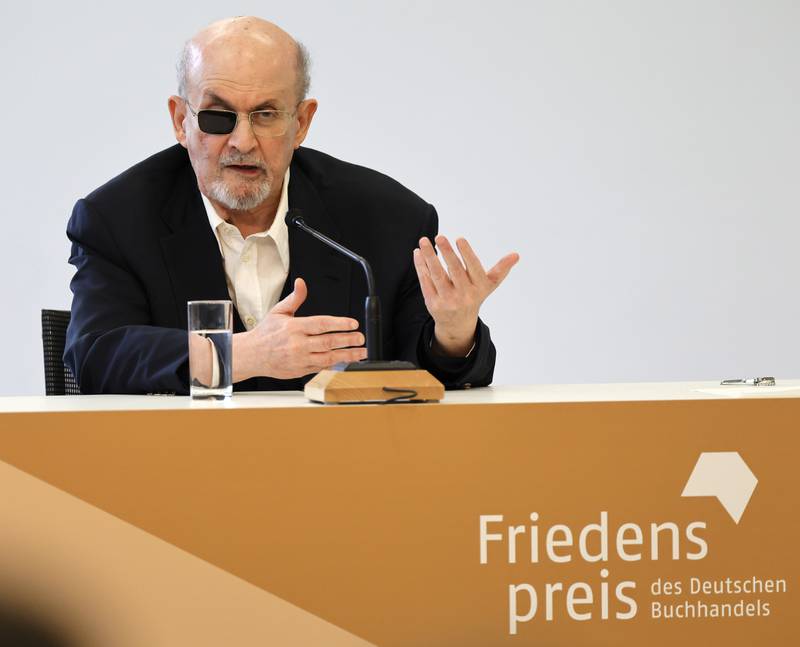Winning the Peace Prize in a time of war is sobering moment for Salman Rushdie.
The Indian-born British-American author says receiving the prestigious award from the German Publishers and Booksellers Association while the Israel-Gaza war rages on made him reflect on what books can offer in times of turmoil.
Live updates: Follow the latest news on Israel-Gaza
“The function of literature in war should be the same as anytime,” he said at a gala event at the Frankfurt Book Fair on Saturday.
“First of all, it is to create beauty, and it’s even more important to create beauty in times of ugliness. It can become a place where people can also go for joy and love and many other things that war time obliterates.”
While Rushdie didn’t directly mention the Israel-Gaza war during his appearance, the comments were part of a rare public appearance since nearly losing his life in a knife attack last year.
Born in Mumbai before moving to the UK and the US, Rushdie is now blind in one eye after being stabbed on stage during a public event in New York State.
The perpetrator, US-born Hadi Matar, was arrested on site and due to stand trial.
Rushdie says being concerned of such an attack has been part of his daily life since the publication of controversial 1988 novel The Satanic Verses.
“I have this way of thinking about it in that, yes, there are things to be frightened of,” he says. “But what you have to do is put that fear into a little box and put it in the corner of the room and then you can have your day.”
Yet despite the courage literature offers – “I am happiest when I write,” he said – words can only do so much in explaining some of the cruelty of human nature.
“We are not very nice as a species and we have our problems,” he says.
“Maybe literature can offer some temporary relief, but I am not sure we can solve the problems and, instead, only explore them. Human life being what it is, there are moments when we reveal our best self and when we can be principled, noble and even likeable.
“And there are moments, such as the one we are living through now, when the opposite is true.”

For an event dubbed by the book fair as focusing “on the major political and social upheavals of our time,” Rushdie wasn’t asked to offer his thoughts on the book fair’s controversial move to cancel the LiBeraturpreis award for Palestinian author Adania Shibli in light of the Israel-Gaza war.
A number of Arabic publishing bodies withdrew their participation from the fair as a result and Shibli, who was to be honoured for the novel Minor Detail, subsequently cancelled her engagements at the book fair.
In a Friday press conference at the book fair, however, Rushdie did comment on the Israel-Gaza war and feared the conflict could result in irreparable damage to the region.
“I am filled with horror about the attack by Hamas,” he said.
“I’m filled with foreboding about what Israel’s Prime Minister Benjamin Netanyahu might do in return. I just hope that there can be a cessation of hostilities at the earliest point.”
Rushdie also confirmed his next work, Knife: Meditations After an Attempted Murder, a memoir of last year’s near fatal attack, will be out next April.
“It would seem kind of absurd to write something else, until I had dealt with this subject,” he said.
Updated: October 22, 2023, 11:08 AM
